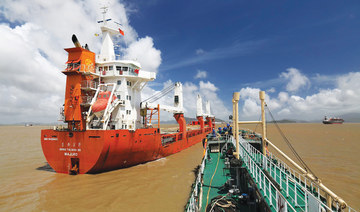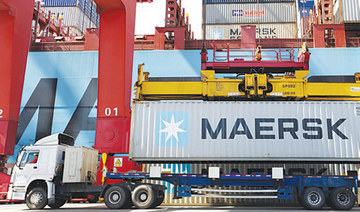LONDON: Faced with imminent new global marine pollution rules, shipping companies and insurers are puzzling over the risks.
To reduce emissions of toxic sulfur that cause premature deaths, shipowners who have long relied on the dirtiest residues of oil extraction will have to either switch to low-sulfur fuel or install exhaust gas cleaning systems from Jan. 1.
Neither option has been fully tested for long, and some problems have already been reported, both with the more expensive new fuels and with devices known as scrubbers which extract the sulfur on board.
Interviews with key players in the industry show varying levels of alarm at potential risks, which they say range from unexpected fires or collisions due to engine failure to liability for inadvertently flouting the rules.
The container shipping industry alone is having to invest $10 billion to adhere to the new rules, analysts say, and is concerned about extra costs were things to go wrong.
If different types of the new, cleaner fuel are mixed, for example, they may produce a residue which could eventually clog up an engine and, in a worst-case scenario, damage or break it.
Several large ship owners said handling the new fuels correctly and making sure the scrubbers were properly deployed would minimize danger, but that if care was not taken, problems could arise.
“The big guys are going to be serviced by the right people … there is bigger risk for the smaller ships,” Hugo De Stoop, chief executive of leading Belgian tanker operator Euronav , told Reuters.
Euronav has bought the equivalent of almost six months’ supply of compliant fuel and is storing it in a megatanker off Malaysia. If a ship is too far away and has to buy fuel, it will try to buy a single type, or, if only a blend is available, ask to see the seller’s lab tests.
“We don’t always believe that people have done the test, been diligent about it,” he said.
Khalid Hashim, managing director of one of Thailand’s largest dry cargo ship owners, Precious Shipping, said it had not allowed co-mingling of marine fuel, also known as bunker fuel, for over five years and required all of it to be sample tested.
“Of course this costs us annually around $100,000, but we prefer that cost than to use untested bunker oil based solely on the Bunker Delivery Receipt and find that we have a massive problem on our ship,” he said.
The company had taken measures to reduce its ships’ fuel consumption to offset some of the extra costs and had installed extra compartments for the tanks on board to avoid mixing, he said.
“That way we would have future-proofed our ships for the IMO 2020 regime,” Hashim said, referring the UN International Maritime Organization’s rules, agreed by more than 90 countries in hopes of saving more than half a million lives by 2025 alone.
Around 172 ships have avoided the problem because they are powered by sulfur-free liquefied natural gas (LNG), data from Norwegian risk management and certification company DNV GL showed, but this in an expensive option.
Some ship owners have balked at paying for the new 0.5% sulfur fuel, which is quoted at more than twice the price of the 3.5% high-sulfur grade in northern Europe at the moment.
More than 3,000 ships — around 5% of the global fleet — will have scrubbers fitted by 2020 so they can clean the exhaust gas and so continue using existing fuel, the DNV GL data showed.
Some ports have banned one type of scrubber, the open-loop version which empties washwater residues into the sea, and insurers have reported cases of fires or corrosion with the devices.
Norwegian ship insurer Gard cited a few cases where sparks from welding or cutting fell into a scrubber through uncovered openings: in one case it spread to the engine room through glass reinforced epoxy piping.
If corrosion was legally deemed to be inevitable, underwriters might try to deny related claims, said Stephen Harris, senior vice president with insurance broker Marsh.
“Whether underwriters adopt this line or not could depend on how frequent and how big the problem becomes next year.”
Roger Strevens, VP of global sustainability with Norwegian shipping company Wallenius Wilhelmsen, said its experience with scrubbers had shown risks could be minimized if done properly. “If you buy cheap, you’ll pay twice,” he said.
Nautilus International, a union which represents over 20,000 workers in shipping, said the use of new fuel types would place extra strain on crews, who have reported incidents including power loss when changing fuels, filter problems and leaks.
“These are complex requirements,” Nautilus professional and technical officer David Appleton said, calling for comprehensive training and protection in cases of inadvertent infringements.
An underlying problem is that oil refineries are not obliged to produce tailor-made shipping fuel, said Neil Roberts, head of marine underwriting at Lloyd’s Market Association, which represents the interests of all underwriting businesses in London’s Lloyd’s insurance market.
“The ship’s crew has to test it and filter it,” he said.
The IMO said it does not have a remit to regulate the fuel industry but that international standards for the new fuel and information about compatibility between types had been issued as part of comprehensive preparations.
“IMO is ready, and we are confident IMO member states and the shipping sector are ready for January 1,” an IMO spokesperson said.
Protection and Indemnity (P&I) clubs, through which groups of shipping companies cover injury and pollution claims, are in wait-and-see mode.
Alvin Forster, deputy director with North P&I club, cited possible engine failure in busy shipping lanes, while Precious Shipping’s Hashim said members investing in expensive low-sulfur fuel should not have to share the loss on any scrubber claims.
Harris from Marsh, a broker active in marine insurance including hull and machinery, said assessing cover was still guesswork: for instance, who should pay a fine for a ship using high-sulfur fuel because no alternative was available?
“Is it non-compliance?” he said. “The question marks are bigger than the answers.”
Shipping industry sails into unknown with new pollution rules
https://arab.news/9drpb
Shipping industry sails into unknown with new pollution rules
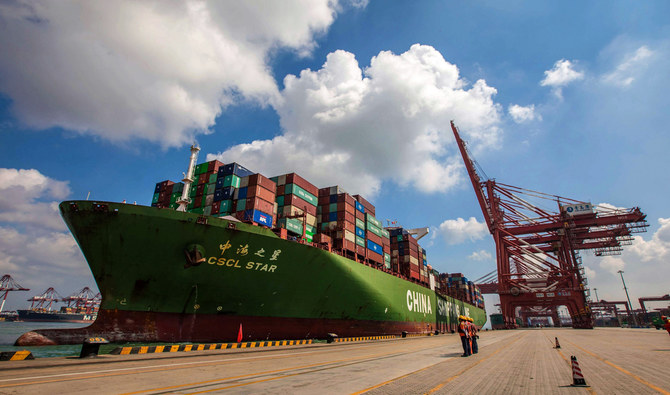
- New rules aim to avert 570,000 premature deaths by 2025
- Regulation kicks in Jan. 1, shipping sector nervous
Oil Updates – prices surge 3% on reports of Israeli strikes on Iran

LONDON: Oil prices jumped $3 a barrel on Friday in reaction to reports that Israeli missiles had struck a site in Iran, sparking concerns that Middle East oil supply could be disrupted.
The benchmark contracts surged more than $3 then eased slightly. At 5:00 a.m. Saudi time, Brent futures were up $2.63, or 3 percent, to $89.74 a barrel.
The most active US West Texas Intermediate contract climbed $2.56, or 3.1 percent, to $84.66 per barrel.
US news outlet ABC News cited a US official as saying that Israeli missiles had hit a site in Iran.
Iran’s Fars news agency said explosions were heard at an airport in the Iranian city of Isafahan but the cause was not immediately known. Several flights were diverted over Iranian airspace, CNN reported.
“If these reports turn out to be true, fears over further escalation will only grow, as well as concerns that we are potentially moving closer toward a situation where oil supply risks lead to actual supply disruptions,” Warren Patterson, head of commodities strategy at ING, said in a note.
The reports have sparked worry that Israel has responded to Iran’s drone and missile attack of last weekend, Patterson said.
Last weekend Iran launched hundreds of drones and missiles in a retaliatory strike after a suspected Israeli strike on its embassy compound in Syria. Most of the drones and missiles were downed before reaching Israeli territory, with minimal damage and casualties.
Investors have been closely monitoring Israel’s reaction to the April 13 Iranian drone attacks. The geopolitical risk premium in oil prices had been unwinding this week on the perception that any Israeli retaliation to Iran’s attack would be moderated by international pressure.
In global crude oil supply, Venezuela lost a key US license allowing the OPEC member to export oil to markets globally. The US also announced sanctions on Iran, another OPEC member, targeting its unmanned aerial vehicle after the country’s drone strike on Israel last weekend.
The sanctions on Iran, however, exclude its oil industry.
Saudi Arabia’s AI adoption ignites technological advancement and economic growth
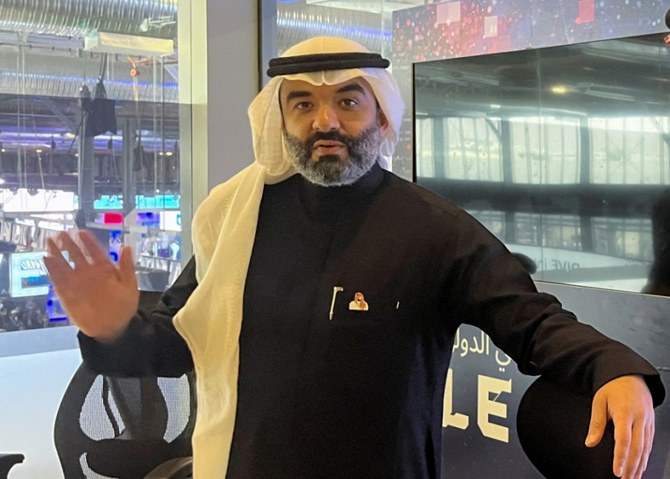
- Adoption of AI will help foster a knowledge-based economy and equip Saudi youth with skills for the digital age
- Key initiatives, include the National Strategy for Data and AI, aim to establish Saudi Arabia as a global AI leader by 2030
RIYADH: As artificial intelligence gains global attention and becomes a buzzword, Saudi Arabia is positioned for accelerated adoption to enhance efficiency across its industries.
Over the years, AI has evolved into a transformative technology revolutionizing numerous industries and domains. Its development and adoption across sectors have spurred significant advancements, already reshaping how people live and work globally.
According to a recent report by the professional services firm PwC, the projected economic impact of AI in the Middle East by 2030 is $320 billion, with an estimated $135.2 billion attributed to Saudi Arabia.
The report also highlights an annual growth rate in AI contribution ranging between 20 percent and 34 percent across the region, with the UAE experiencing the fastest growth, followed by Saudi Arabia.
“Such growth and demand for AI demonstrated that the impact on industries can be substantial and wide-ranging both in Saudi Arabia and the wider region,” said Slava Bogdan, CEO & co-founder at Flowwow, to Arab News.
Flowwow, a global gifting marketplace, simplifies gift-giving and connects local brands with customers. It hosts over 14,000 local brands from 1,000 cities and operates in over 30 countries, including the UAE, Spain, the UK, and Brazil.
“Whether it’s hospitality, manufacturing, telecommunication, or business technologies, where Flowwow sits, I could say that AI solutions, firstly, could automate repetitive tasks, allowing employees to focus on more strategic and creative work, especially in data analysis, customer service, and marketing,” Bogdan said.
The CEO further explained how the firm’s marketers frequently utilize AI to target audiences, enhance creatives, or conduct competitive analysis, particularly in global markets like the Middle East and North Africa. This reduces decision-making time and allows for more strategic tasks that necessitate a tailored approach.
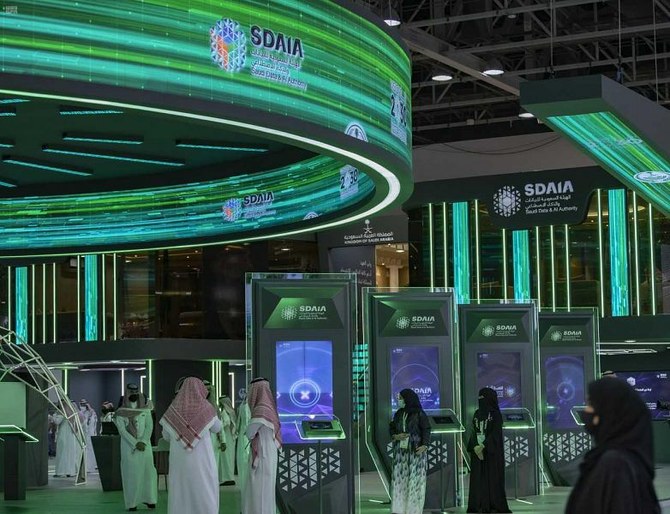
“Moreover, AI algorithms can analyze large amounts of data to identify patterns and trends, helping businesses make more informed decisions,” Bogdan explained.
“This attribute can lead to better forecasting, resource allocation, and risk management, especially in the financial sector, having had 25 percent of all regional AI investments,” he added.
Speaking to Arab News, Brahim Laaidi, partner at Bain & Co., emphasized that AI adoption in sectors like energy and healthcare aids “the Kingdom’s economic diversification and fosters a knowledge-based economy, enhancing efficiency and driving growth.”
Moreover, AI is recognized for enhancing customer experience and reducing costs for firms in various ways.
DID YOU KNOW?
• Saudi Arabia was one of the first nations to utilize data and artificial intelligence technologies to achieve its Vision 2030 goals.
• There are five prominent types of AI: machine learning, natural language processing, computer vision, speech recognition and robots.
• The Saudi Data and AI Authority has created AI ethics principles in accordance with the Kingdom’s commitment to human rights.
• SDAIA estimates SR412.5 billion ($109.96 billion) in global spending on AI by 2024 end.
“AI chatbots and virtual assistants provide 24/7 customer support, reducing costs. Multiple Saudi firms and banks use chatbots for customer service,” highlighted Laaidi.
He also illustrated how AI analyzes customer behavior to create personalized experiences, citing examples like Netflix and Spotify, which utilize AI to tailor content based on user preferences and listening habits.
Laaidi also highlighted how “AI facilitates segmentation based on behavior and profitability for targeted marketing. Coca-Cola utilizes AI for consumer segmentation.”
“In a nutshell, for most enterprises, the focus remains on leveraging narrow or vertical AI solutions to enhance specific business processes, improve customer experiences, or optimize operations,” he added.
According to Jad Haddad, head of Digital IMEA at management consulting firm Oliver Wyman, AI essentially democratizes access to intelligence, making it cheaper and more widely available.
This can generate significant efficiencies by augmenting employee capabilities, enabling them to complete tasks faster, and automating certain processes without human intervention.
Oliver Wyman estimates that up to 35 percent of tasks globally may be augmented or automated by AI in the next three years.
“In Saudi Arabia, considering the current economic structure, Oliver Wyman estimates that up to 17 percent of tasks may be affected within that time frame,” Haddad told Arab News.
AI projects and employment
It is evident that the Kingdom has been significantly investing in AI in recent years.
Key initiatives, according to Laaidi, include the National Strategy for Data and AI, aiming to establish Saudi Arabia as a global AI leader by 2030. Additionally, Neom, a planned smart city, is poised to leverage AI in urban planning and environmental management.
“The Saudi Data and Artificial Intelligence Authority was established in 2020 to regulate AI development, and Tonomous collaborates with global tech leaders to enhance the city’s projects,” he added.
Laaidi continued by stating that AI and Robotics Centers, formed through partnerships with universities and international entities, are advancing AI in the Kingdom. From a technology industry perspective, it offers diverse applications and significant benefits.
According to Cristina Carranza, global head of business development at GGTech Entertainment, AI stands as a powerful tool with vast potential to enhance operational efficiency across various domains.
“We use AI selectively, focusing on specific areas where it can augment human skills and improve processes,” Carranza told Arab News.
She gives examples of how AI algorithms are utilized to analyze player data and preferences, enabling them to tailor game experiences and enhance player engagement. “In addition, AI-driven predictive analytics help us anticipate market trends and make informed decisions.”
However, Carranza emphasized the importance of acknowledging that while AI is embraced as a tool for progress, there is a recognition of the necessity of human oversight and control.
“We believe in a symbiotic relationship between humans and AI, where the technology enhances our capabilities but is always subject to human direction and control,” she added,
New dimensions
From GGTech Entertainment’s perspective, AI opens up exciting new dimensions in gaming and entertainment.
Carranza revealed that one significant area involves the optimization of game design processes, where AI algorithms analyze player feedback and behavior data to inform the creation of more engaging and immersive gaming experiences.
“Additionally, AI-powered tools enhance player interaction through personalized recommendations and real-time assistance, fostering deeper engagement and loyalty,” she explained.
The global head further addressed how AI-driven analytics offer valuable insights into player behavior and market trends, empowering GGTech to make data-driven decisions and maintain a competitive edge in the industry.
Bridging skill gaps
The Kingdom’s journey to become an AI leader involves challenges encompassing ethical and legal aspects, data availability and quality, as well as skill gaps, infrastructure requirements, public trust, and the need for international collaborations.
“To navigate these dilemmas, the SDAIA and the National Data Management Office have been established to construct ethical guidelines and improve data governance,” Laaidi explained.
Similarly, the National Cybersecurity Authority continues to safeguard Saudi Arabia's digital infrastructure, including AI systems.
Laaidi emphasized Saudi Arabia’s prioritization of STEM education and training to bridge skill gaps, citing initiatives like the Prince Mohammed bin Salman College of Cyber Security aimed at fostering local talent in AI-related fields.
He highlighted the importance of focusing on STEM disciplines for developing a workforce equipped with the necessary skills for an AI-driven future.
Opinion
This section contains relevant reference points, placed in (Opinion field)
“Substantial investments are being made in infrastructure, with emphasis on high-performance computing and cloud computing capabilities to support AI development and deployment. Building public trust is also a key venture for the Kingdom,” the partner stressed.
In addition, the Kingdom seeks international collaborations with leading AI research entities worldwide to expedite AI capabilities. “By addressing these challenges strategically, Saudi Arabia aims to create a conducive environment for AI development and adoption,” he emphasized.
From a technological perspective, the adoption of AI can present challenges in navigating ethical considerations and ensuring human control.
“At GGTech, we recognize the importance of maintaining human oversight and ethical standards while leveraging AI technologies. To address this challenge, we prioritize transparency and accountability in our AI algorithms and processes, ensuring they are aligned with our values and ethical guidelines,” Carranza described.
She further added that they invest in ongoing training and education for team members to enhance their understanding of AI and its implications, enabling them to make informed decisions and mitigate potential risks.
Reskilling Saudi workforce
Undoubtedly, marketers and creative leaders should prepare for the changes in their professional field resulting from AI adoption.
Bogdan explained that one of the crucial skills is the ability to ask AI the right questions and write clear prompts. He emphasized that it is necessary to understand, at least at a basic level, how AI algorithms work.
“At Flowwow, we acquaint employees with the different instruments to make AI a helpful assistant that allows us to analyze competitors’ websites, fact-check and edit texts, test tasks, and answers,” he continued.
The CEO highlighted that as the Kingdom invests resources to integrate AI into every sector, it creates more opportunities for entrepreneurs to establish their businesses and startups equipped with AI tools.
“Hence, apps and services developed with AI solutions will be on the edge. In this case, product managers and programmers should gain a thorough understanding of machine learning to create up-to-date apps,” Bogdan highlighted.
The CEO stressed that it will mostly be up to companies to invest in continuous learning and upskilling through educational short courses for their workers. “This investment is crucial to ensure that the workforce remains competitive and competent in leveraging advancements in AI effectively.”
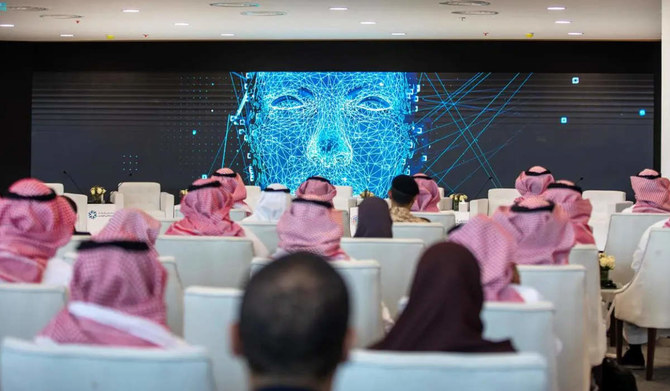
Saudi Vision 2030
AI is a driving force behind Saudi Arabia’s Vision 2030, fueling economic diversification, smart cities, and public service transformation.
According to Laaidi, “AI boosts innovation across non-oil sectors, enables intelligent urban planning in projects like NEOM, and promotes Industry 4.0 through automation and predictive maintenance.”
“AI also improves government services via chatbots, automation, and analytics. In healthcare, AI enhances medical imaging, drug discovery, and personalized medicine,” he highlighted.
On top of that, Laaidi emphasized how AI educational tools prepare the workforce and optimize resource allocation, while support for clean energy promotes sustainability.
“Vision 2030 powered by AI seamlessly connects economic domains, accelerating progress and innovation across the Kingdom,” he affirmed.
On another note, GGTech Entertainment's use of AI aligns with the goals of Saudi Vision 2030 by driving innovation, promoting economic diversification, and empowering Saudi youth with advanced skills and capabilities, according to the firm's global head.
“One way AI contributes to this vision is by enhancing gaming experiences and promoting the Kingdom as a global hub for entertainment and technology,” said Carranza.
By utilizing AI-powered tools for game design, player interaction, and analytics, GGTech Entertainment is delivering cutting-edge gaming experiences that showcase Saudi Arabia’s technological prowess and creativity to a global audience, she emphasized.
“In addition, the use of AI creates opportunities for job creation and economic growth in the Kingdom. As GGTech expands its AI capabilities, it is investing in the development of a skilled workforce with expertise in AI technologies and data analytics,” the company’s global head said.
She concluded by highlighting how this not only aligns with the goals of Saudi Vision 2030 to foster a knowledge-based economy but also equips Saudi youth with the skills they need to thrive in the digital age.
ACWA Power, IRENA join hands to accelerate global renewable energy transition
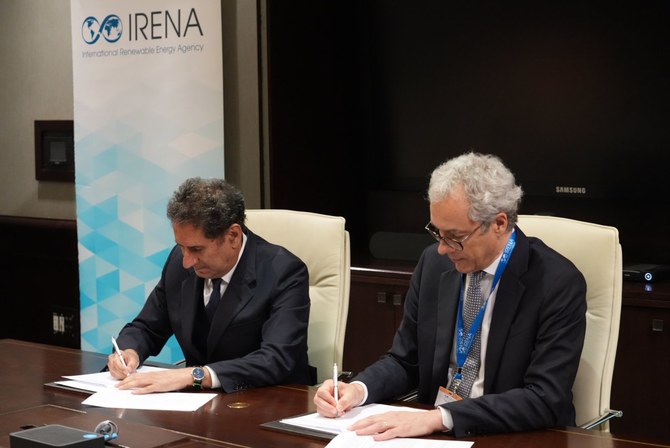
RIYADH: In a bid to add impetus to the adoption of clean energy sources worldwide, Saudi utility firm ACWA Power has signed a deal with the International Renewable Energy Agency, said a press release issued on Thursday.
The Saudi-listed firm said that the partnership aligns with its mission to provide sustainable energy solutions and seeks to accelerate the adoption and sustainable use of renewable energy across the globe.
ACWA Power will work closely with IRENA to share crucial insights on infrastructure investment in renewable energy, green hydrogen advancement, solar energy, smart grids, and the intersection of energy and water, the press release said.
The Saudi-listed company also announced its participation in various IRENA initiatives, such as Green Hydrogen, Collaborative Frameworks, Project Facilitation, the Alliance for Industry Decarbonization, the Utilities for Net-Zero Alliance, and the Coalition for Action.
As per the deal, ACWA Power and IRENA will investigate avenues to mobilize finance and investment for renewable energy projects, while also supporting infrastructure for the development, storage, distribution, transmission, and consumption of renewables.
Moreover, collaborative workshops and seminars will be arranged to exchange best practices, enhance skills, and promote awareness of the energy transition among youth, professionals, and the public using IRENA’s platforms and programs.
ACWA Power CEO Marco Arcelli said the partnership with IRENA marks a significant milestone in his company’s journey toward a sustainable energy future.
“By combining our strengths and resources, we are prepared to drive meaningful change and accelerate the transition to renewable energy on a global scale,” he said.
The CEO added that through collaborative partnerships and innovative solutions, ACWA Power remains committed to advancing the widespread adoption and sustainable use of renewable energy, shaping a brighter and more sustainable future for generations to come.
IRENA Director General Francesco La Camera commented: “We have less than a decade left to secure a fighting chance for a 1.5°C world. Accelerating the renewable-based energy transition needs industry leaders and this deal between IRENA and ACWA Power stands for the growing commitment of global industry to act on decarbonization.”
He added: “We need to act together to accelerate the sustainable use of renewables and green hydrogen across the globe.”
Closing Bell: TASI ends the week in green with trading turnover at $2.18bn
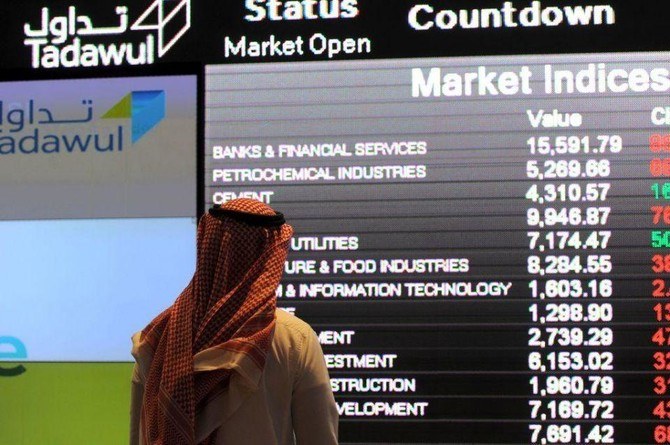
RIYADH: Saudi Arabia’s Tadawul All Share Index rose on Thursday, gaining 36.37 points, or 0.29 percent, to close at 12,502.35.
The total trading turnover of the benchmark index was SR8.19 billion ($2.18 billion) as 130 stocks advanced, while 90 retreated.
The MSCI Tadawul Index also increased by 5.98 points, or 0.38 percent, to close at 1,575.11.
The Kingdom’s parallel market, Nomu, followed suit and gained 305.77 points, or 1.16 percent, to close at 26,418.75. This comes as 33 stocks advanced, while as many as 27 retreated.
The best-performing stock on the main index was Saudi Arabian Amiantit Co., as its share price rose by 7.69 percent to SR30.80.
Allianz Saudi Fransi Cooperative Insurance Co. also performed well as its share price saw a 6.79 percent increase to close at SR20.16.
This comes as Abu Dhabi National Insurance Co. completed a strategic acquisition of a 51 percent stake in Allianz, according to the Emirates News Agency, WAM.
ADNIC Chairman Mohamed Al- Nahyan told WAM: “The connection between the UAE and Saudi Arabia is deep, mutually beneficial and ever-growing. At ADNIC, we see Saudi Arabia as a high-potential market which perfectly aligns with our overall growth strategy, and we are looking forward to unlocking new possibilities for growth and success.”
Other top performers include United Cooperative Assurance Co. and Saudi Pharmaceutical Industries and Medical Appliances Corp. whose share prices soared by 5.68 percent and 5.51 percent, to stand at SR11.16 and SR14.16 respectively.
The worst performer was Alkhaleej Training and Education Co., whose share price dropped by 5.27 percent to SR33.25.
On the announcements front, Saudi mining giant and Public Investment Fund subsidiary, Saudi Arabian Mining Co., known as Ma’aden, announced the launch of single stock options in a statement on Tadawul.
SSOs will enable local and international investors to effectively hedge and manage portfolio risks as well as diversify products available for trading in the market.
Saudi minister calls for ‘decisive financial policies’ to counter global economic uncertainties
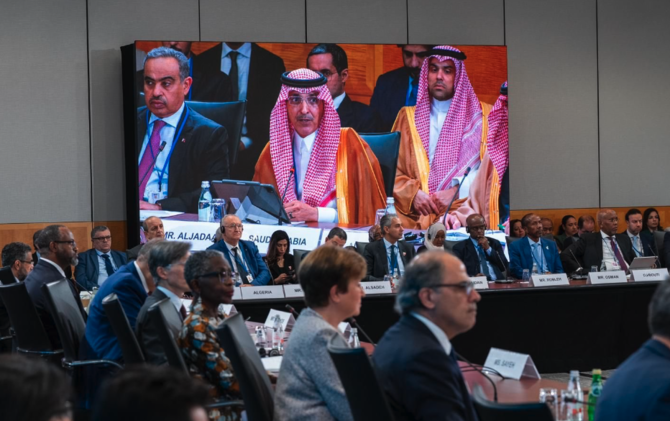
RIYADH: Saudi Arabia’s finance minister on Thursday stressed the need for “decisive financial policies” across the world to navigate through uncertain economic conditions.
Speaking during the Spring Meetings 2024 of the IMF held in Washington, D.C, Mohammed Al-Jadaan noted that such a decisive approach would bolster resilience and sustainability amid the ongoing uncertainties.
He was attending a meeting of finance ministers and governors of the Middle East, North Africa, Afghanistan and Pakistan region with IMF Managing Director Kristalina Georgieva.
“I also participated in the Global Sovereign Debt Roundtable, where I highlighted the importance of enhancing Comparability of Treatment by establishing a clear and fair framework that ensures equitable treatment among all creditors,” Al-Jadaan said in a post on X.
Additionally, the minister participated in the second G20 finance ministers and central bank governors’ meeting held under the Brazilian presidency in Sao Paulo. He emphasized that effective climate action required a holistic approach.
He said that can be achieved “by integrating diverse sectors acknowledging the diversity of solutions to address climate challenges, including using innovative technologies to manage emissions.”
Al-Jadaan also met with Jose Vinals, chairman of Standard Chartered Bank, to discuss the regional and global economic outlook.
He also met with Spanish Minister of Economy, Trade, and Business, Carlos Cuerpo to discuss ways to enhance relations between the two countries.
Moreover, Al-Jadaan held talks with Jean Lemierre, chairman of Bank BNP Paribas, the global head of Official Institutions Coverage, Laurent Leveque, and the head of Debt Capital Markets, Alexis Taffin.
They discussed progress made in Saudi Arabia, as well as issues related to attracting investment and alternative financing.



